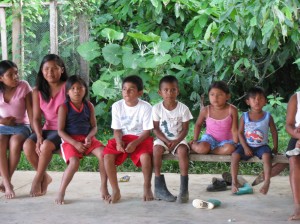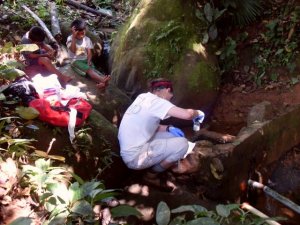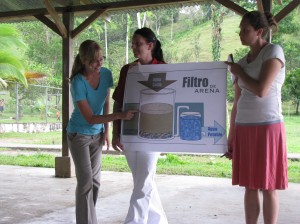Background
 Among the smallest and most impoverished indigenous groups in Panama, the Naso people number approximately 3,300 and are spread across eleven communities in the Bocas del Toro region of northwest Panama. EWB-AUS has partnered with the community of Sieykin, which has a population of 400 people. This community lacks access to many basic services, including water treatment, a reliable water distribution system, sanitation infrastructure, health services, and electricity. Unsanitary conditions, coupled with consumption of non-potable water, cause the people of Sieykin to suffer from numerous health issues including respiratory illness and gastrointestinal complications such as diarrhea. The cost of treating these diseases contributes to the cycle of poverty that afflicts the region.
Among the smallest and most impoverished indigenous groups in Panama, the Naso people number approximately 3,300 and are spread across eleven communities in the Bocas del Toro region of northwest Panama. EWB-AUS has partnered with the community of Sieykin, which has a population of 400 people. This community lacks access to many basic services, including water treatment, a reliable water distribution system, sanitation infrastructure, health services, and electricity. Unsanitary conditions, coupled with consumption of non-potable water, cause the people of Sieykin to suffer from numerous health issues including respiratory illness and gastrointestinal complications such as diarrhea. The cost of treating these diseases contributes to the cycle of poverty that afflicts the region.
This project will support Naso self-sustenance through the improvement of their local infrastructure. The principal objective of our project is to reduce waterborne diseases by providing the community with clean water, sanitation, and health education. Improving the water quality will entail the installation a reliable water distribution and storage system. A health education campaign will develop the community’s understanding of disease transmission and prevention.
The EWB-AUS Response
The principal objective of EWB-AUS’s project is to reduce waterborne diseases by providing the community with clean water, sanitation, and health education. The first step is to improve the water quality by installing a potable water system and upgrading the existing water distribution system. During assessment and implementation, community understanding of disease transmission and prevention will be promoted through a health and hygiene campaign.
Assessment
EWB-AUS traveled to Sieykin in January and August 2009. The principal goal of these assessment trips was to meet the community and identify a project goal. In addition to consulting with the people of Sieykin, EWB- AUS also performed health assessments, water tests, land surveys, and assessed materials availability. The health education campaign was launched during the second of these trips. The group also met with a local Rotary Club, Peace Corps, and other NGOs to discuss future collaboration and partnership.
Implementation
During summer 2010, EWB-AUS returned to Sieykin for eight weeks to implement a dual potable and non-potable water system in the central sector of the community. Accomplishments during this trip included: constructing a 5000L poured concrete tank and a water collection box, a water collection box and burying piping from the clean water source to the tank and the main line of piping from the tank to the community center. Also during this trip, health education was taught in the primary school through role play, activity books, and visual tools such as a microscope.
Moving Forward
Future trips will focus on the completion of the first phase of implementation commenced during summer 2010. This includes installing the branches from the main line to each of the households, repairing the existing non-potable tank, and installing an improved water intake device for the non-potable system. Future trips will also focus on assessing the sites of additional water systems in Sieykin and continuing health education efforts.
EWB-AUS is collaborating with the Peace Corps Volunteer recently placed in the community. He will continue efforts on the first phase of the project until the EWB group returns in January 2011.




